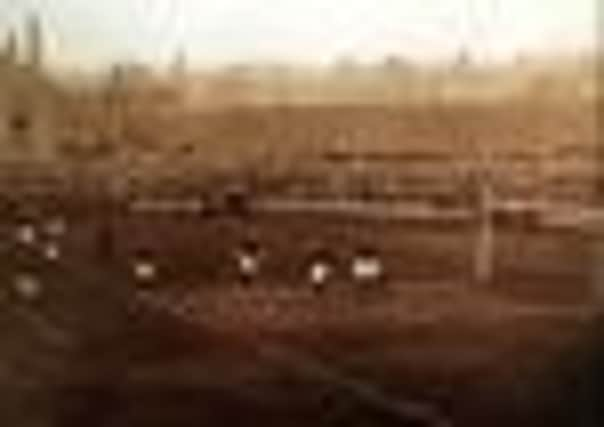Scottish Cup final: Day destined to go down in history


THE game provoked debate over where precisely it should be played, there was a blast of chilly weather to contend with and debate sparked by a team which was chosen not by a coach but by the club’s owners.
The date was Saturday, March 14, 1896. And just like today, Hearts and Hibs were contesting the Scottish Cup final.
Advertisement
Hide AdAdvertisement
Hide AdNaturally, the Evening News was there to record every kick of the ball – and even the fans’ journey to the ground and the post-match postmortem – in astonishing detail.
Today, reading the coverage evokes an age long gone when fans with handlebar moustaches threw flat caps, handkerchiefs and walking sticks in the air to celebrate a goal and 22 men in billowing calf-length shorts booted a hand-stitched leather ball across a muddy Edinburgh pitch – now long lost to the relentless march of property development.
The big game was certainly historic – the first, and so far last, time the Scottish Cup final has been played anywhere other than Glasgow. “For the first time in the history of the Association game,” explained the match report, “the final tie in the Scottish Cup competition has been taken to what Glasgow football people are pleased to call the provinces.”
While Scotland entertained England in a rugby fixture at Hampden, the cup final was relocated to Logie Green, to a Powderhall ground normally occupied by long-gone Division One side St Bernard’s, the previous year’s Scottish Cup winners.
Not that the unnamed Victorian reporter expected an all-Edinburgh final would be such a rarity: “It is not assuming too much to anticipate that the presence of two Edinburgh clubs in the final will always be regarded as a novelty,” he mused. “Of late years the Eastern clubs have got the better of the old Dunbartonshire stumbling blocks, and Glasgow has been met on equal terms.”
Even back then, there were off-pitch battles to win. Renton, beaten 2-1 by Hibs in the semi-finals, had lodged a last-minute protest to the SFA concerning Easter Road full-back Alex Robertson, claiming he had been ineligible to play in the match. The battle ended up before Lord Low in the Court of Session, who kicked out their claim as the hours ticked down to kick-off.
But that wasn’t the only bone of contention. Logie Green, said some, was too small to handle the crowd. In a twist to the recent debate over bringing the final to Edinburgh, supporters then pleaded for the match to be switched to Ibrox.
Those who did head to the game travelled by whatever means possible. “Abundant evidences have been given of the intense public interest in the event,” noted the matchday report.
Advertisement
Hide AdAdvertisement
Hide Ad“Incoming trains at the Caledonian and Waverley Stations this forenoon brought large contingents of country followers of the game to town, one Caledonian train bringing about 700 persons from Glasgow and intermediate stations.
“The North British local trains, notably from the Loanhead district, were mostly crowded, and large numbers came to town by brake. The gates were opened at one o’clock, and from that time crowds poured into the ground.”
Eventually a crowd of 16,034 turned up – 4000 fewer than had been thought would attend – earning the hosts a mere £230.
Behind the scenes, the two clubs were watching the weather and wrestling with team lists. Cup day had dawned, recalled the News, with a “short but trouble-some touch of winter. Snow fell during the afternoon, and very naturally the ground suffered.”
This gave the Hearts hierarchy a dilemma. For this was a team chosen not by a coach, but by the club’s all-powerful committee. And while cup favourites Hibs announced their team well in advance, by morning on cup day Hearts had still had not finalised theirs.
Within minutes of the kick-off, however, it became clear that the lengthy debate may pay off. “The game had a sensational opening, the Hearts trying to rush the opposing defence, and getting more than their desserts in the goal,” noted the match report.
It took the Gorgie men just three minutes to open the scoring. Davie Baird’s goal came as a result of some handling of the ball by Hibs’ right back Jack Robertson. “Baird cleverly scored from a free-kick inside the penalty line,” the News reported. “The goal was received with extraordinary cheering.”
Midway through the second half Hearts’ Alex King made it 2-0, beating two Hibs defenders and shooting into the goal from a tight angle.
Advertisement
Hide AdAdvertisement
Hide AdBefore long Hearts’ Willie Michael scored again, heading past the Hibs keeper. “The Hearts’ followers cheered like mad, and the Hibernians’ sympathisers slowly and dejectedly fled out of the ground,” it was reported.
Hibs battled back, with Irishman Jo O’Neil scoring a late consolation, but it was Hearts’ name on the cup.
All roads led to Powderhall
Back in 1896 the challengers for the Scottish Cup were an eclectic bunch of names, some long gone, others still surviving, some only just . . .
Hearts played away from home three times, sweeping aside Blantyre 2-1, Ayr 3-1 and delivering a 4-0 blow to Abercorn. By the time they arrived at their home pitch to play fellow Edinburgh side St Bernard’s, a tighter match was in prospect. Hearts eventually won the tie by the narrowest of margins, 1-0.
Hibs squeezed a 3-2 win from East Stirlingshire for their first tie. Back home against Fifers Raith Rovers, they triumphed with a stunning 6-1 thumping, setting them up for a tighter but equally delightful 3-2 win over Glasgow rivals Rangers. Their home tie semi-final against Renton saw them snatch a 2-1 win.